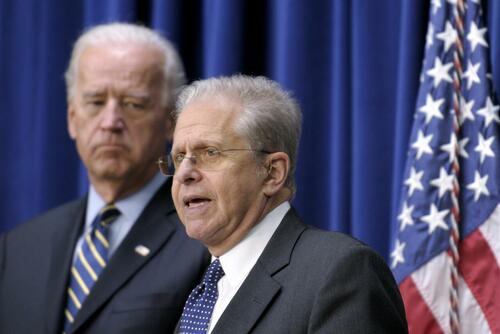Tribe: The Criminal Case Against Trump Is Another “Slam Dunk”
In past columns, we have discussed the litany of “slam dunk” crimes that Harvard Law professor Laurence Tribe has declared as established against former President Donald Trump, none of which have been actually charged.
Indeed, Tribe appears intent upon running through the entire criminal code.
Just for the purposes of keeping score, Tribe declared evidence supporting criminal charges of witness tampering, obstruction of justice, criminal election violations, Logan Act violations, extortion, espionage, attempted murder, and treason by Trump or his family. This week, Tribe insisted on MSNBC that Trump yet again is facing a “slam dunk” criminal conviction over the raid on Mar-a-Lago.
While some of us have suggested that we wait to see the actual evidence before evaluating the risk in the case, Tribe again is confident that the still uncharged case has already been made.
Just last month, Tribe declared Trump clearly guilty of the attempted murder of Vice President Mike Pence on January 6, 2021. Tribe again insisted that the case could be prosecuted “without any doubt, beyond a reasonable doubt, beyond any doubt, and the crimes are obvious.” I guess there is no doubt. There is also no compelling legal basis for the claim. Nevertheless, Tribe promised more if needed: “There are other crimes that have been proven. Those are plenty to start with.”
It is a curious thing that none of these prior “proven” crimes have been charged. After the riot, District of Columbia Attorney General Karl Racine announced that he was considering arresting Trump, Donald Trump Jr., Rudy Giuliani and U.S. Rep. Mo Brooks and charging them with incitement. So what happened to that prosecution? The failure of Racine to charge Trump was not due to any affection or loyalty to the former president. It was due to the paucity of direct evidence of a crime that would hold up in court.
Now, without an indictment or the public disclosure of actual evidence beyond the inventory list, Tribe sees no reason to wait for proof. The evidence is, again, a “slam dunk” for conviction.
While the three criminal provisions cited in the warrant do not require that the documents be classified, the declassification of the documents could make the case more difficult and could raise difficult issues of a president’s inherent declassification authority. As I have previously discussed, we have not seen what Trump refers to as a “standing order” of declassification. However, to the extent that declassification relates to Trump’s intent in possessing these documents, a court could have to grapple with some novel constitutional questions. While a former president loses such inherent authority, Trump is claiming that he declassified the material when he was still president. Tribe dismisses such claims but, again, we have yet to see the alleged order or the specific claims made in past exchanges between the former president and the Justice Department.
Notably, at the start of the interview, Tribe argues against the release of any of the affidavit. While many of us thought the court would likely defer to the Justice Department, it was also clear (in my opinion) that portions could be released. Anyone familiar with these affidavits knows that there are portions that can be released, including sections with information that are already known to the target. We are interested in not only what was presented to the court but how it was presented given the history of the Department in making false or misleading statements in past Trump-related investigations.
Notably, Tribe also insisted that any release would “violate important rules on grand jury secrecy.” The problem is that we have not heard of any grand jury on the Mar-a-Lago matter. This was a warrant sought from the court based on probable cause of possible criminal offenses. There also has been no suggestion that the warrant incorporated material from other grand juries like the ongoing January 6th grand jury. Ironically, if Tribe has been given such information from sources, it would likely be a Rule 6(e) violation. Moreover, if this warrant is an attempt to acquire evidence for a separate investigation, it would contradict the public statements of the Justice Department that this was prompted to protect national defense information.
Tribe added that ” this man . . . I was going to call him ‘traitor’ but that is not quite right it is not treason.” Actually, Tribe previously suggested that Trump was a traitor and could be charged with treason.
Tribe has, of course, never lacked confidence that his lengthening list of crimes have been proven “without any doubt, beyond a reasonable doubt, beyond any doubt.” He is not alone in such hair-triggered analysis.
It has been the signature of much of the legal analysis in the last six years. Yet, it would be useful. . . just once . . . if only for appearances . . . to start with the release of actual evidence before discussing slam dunk convictions.
Tyler Durden
Sat, 08/20/2022 – 12:30

